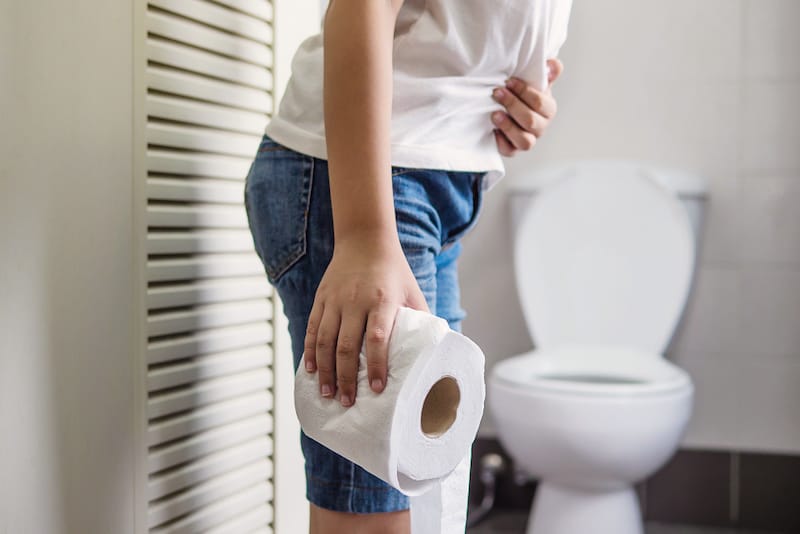You may have hard poop, which then becomes runny because of conditions such as irritable bowel syndrome, food poisoning, and gastrointestinal infections. Intestinal contractions, hyper-sensitivity, infections, childhood stress, and changes in microbes can cause irritable bowel syndrome.
Nowadays, most complaints in hospitals and clinics concern complications related to the digestive system. Doctors have to deal with such cases daily.
Complications associated with the digestive system are countless and as hard to diagnose and treat as they are numerous.
Many people complain of having normal poop when they go for a long call which turns mushy. This complaining is because we can relate to so many complications associated with the digestive system. Even so, proper consultation and tests must be conducted to come up with a correct diagnosis and treatment.
Your poop could be turning runny due to a common condition related to the digestive system. The condition is commonly known as irritable bowel syndrome.
Irritable bowel syndrome may have many causes and is an elusive subject to many medical practitioners and patients. However, we will do our best in our article to ensure we fully understand everything about irritable bowel syndrome.
In other cases, your poop may start solid and runny due to gastrointestinal infection, food poisoning, and diet change. We’ll discuss the details in-depth to eradicate any confusion and also help you know what precautions to take to avoid some preventable gut complications.
Many people have lined up many homemade remedies for stomach and gastrointestinal disturbances and stored countless brands of over-the-counter medications such as anti-acids.
Even so, it would be best to remember that such remedies and pills may work today and fail the next day since they only take care of the symptoms, not the real cause of the complication.
Therefore it is important to learn the cause of such gastrointestinal disturbances that causes solid poop, which turns runny after that.
What causes solid poop to turn runny?
1. Irritable bowel syndrome

Unlike other trivial and momentarily gut complications, irritable bowel syndrome tends to be a lifelong gastrointestinal complication though it turns on and of depending on different factors.
Though not all people experience severe symptoms, most complain about abdominal pain and cramping followed by excessive or mild bloating.
They also see a noticeable change in the frequency of their bowel movement. You may also notice mucus in your stool.
Most of the symptoms come and go and can be handled. However, when you realize you have begun to lose weight, experience nocturnal diarrhea, and see blood in your stool, your state is worsening, and you should seek immediate medical intervention.
You must see a doctor and avoid further escalating the condition, which could put your health in great danger and jeopardy.
So, what causes irritable bowel syndrome?
Intestinal muscle contractions
The entire alimentary canal wall, from the mouth to the rectum, is lined with circular and longitudinal muscles whose systematic contractions and relaxations assist the movement of substances along it.
People with irritable bowel syndrome have stronger contractions that tend to last longer than they normally should.
Such strength and longevity of the contractions cause a gas backup, bloating, and diarrhea.
On the other hand, some people with irritable bowel syndrome may have very weak contractions, which slow the movement of substances in the gut, hence dry and hard stool.
Nervous system sensitivity
Some people with IBS tend to have very hyper-sensitive nervous system receptors in their guts.
The sensitivity may make them experience more pain and discomfort when their gut distends from gas or stool.
People with less sensitive guts would not even feel such pain or discomfort, given that it is on the same scale.
Gastrointestinal infections
Some infections, such as bacterial, fungal, and viral gut infections, may cause irritable bowel syndrome in the long run.
So before you wonder where you got your IBS from, consider that bout of cholera, ameba, dysentery, or helicobacter pylori.
Rest assured that such infections may cause the current syndrome in your gut.
Childhood stress
When stressed, our guts tend to secrete excessive digestive fluids, which can severely hurt our bowels.
In addition, younger people tend to have tender and growing organs, which may be much more susceptible to excesses in digestive fluid production.
So when stressed at an early age, you may end up developing IBS in the long run.
Microbial alterations
The normal gut of a human being harbors symbiotic microbes in the thousands ranging from viruses, bacteria, and fungi, among others. Microbes help with our health as they benefit from living within our guts.
Now researchers reveal that microbe concentration in people with IBS differs from those without IBS. So perhaps that difference in microbe concentration is, in the first place, the cause of IBS or a major contributing factor.
IBS gets easily triggered by unhealthy greasy foods, foods we are allergic to, and high-stress levels.
2. Food poisoning and gastrointestinal infections

Now, even in the absence of dire conditions like irritable bowel syndrome, other factors like food intestines and infections can cause a considerable change in the frequency and texture of our bowel movement.
You may have normal hard poop at one moment, but when the infection or poisonous substance kicks in, your poop turns watery and runny.
If you have no history of IBS, you may have to find immediate medical intervention since some infections and poisonous substances can be fatal and life-threatening.
FAQs
What does your poop look like with IBS?
With IBS, your poop can be runny due to strong and long-lasting intestinal contractions, while it can be hard and dry from weak intestinal contractions.
Conclusion
For us to live, we must eat.
Eating keeps our body provided with essential life-giving nutrients. But, for them to be ingested and absorbed perfectly, we must have a sound digestive system free from syndromes and conditions.
Therefore we must protect our guts through proper eating habits and lifestyles from IBS and other infections.
When we, unfortunately, have such conditions, we must take appropriate medical steps to remedy or manage them.


